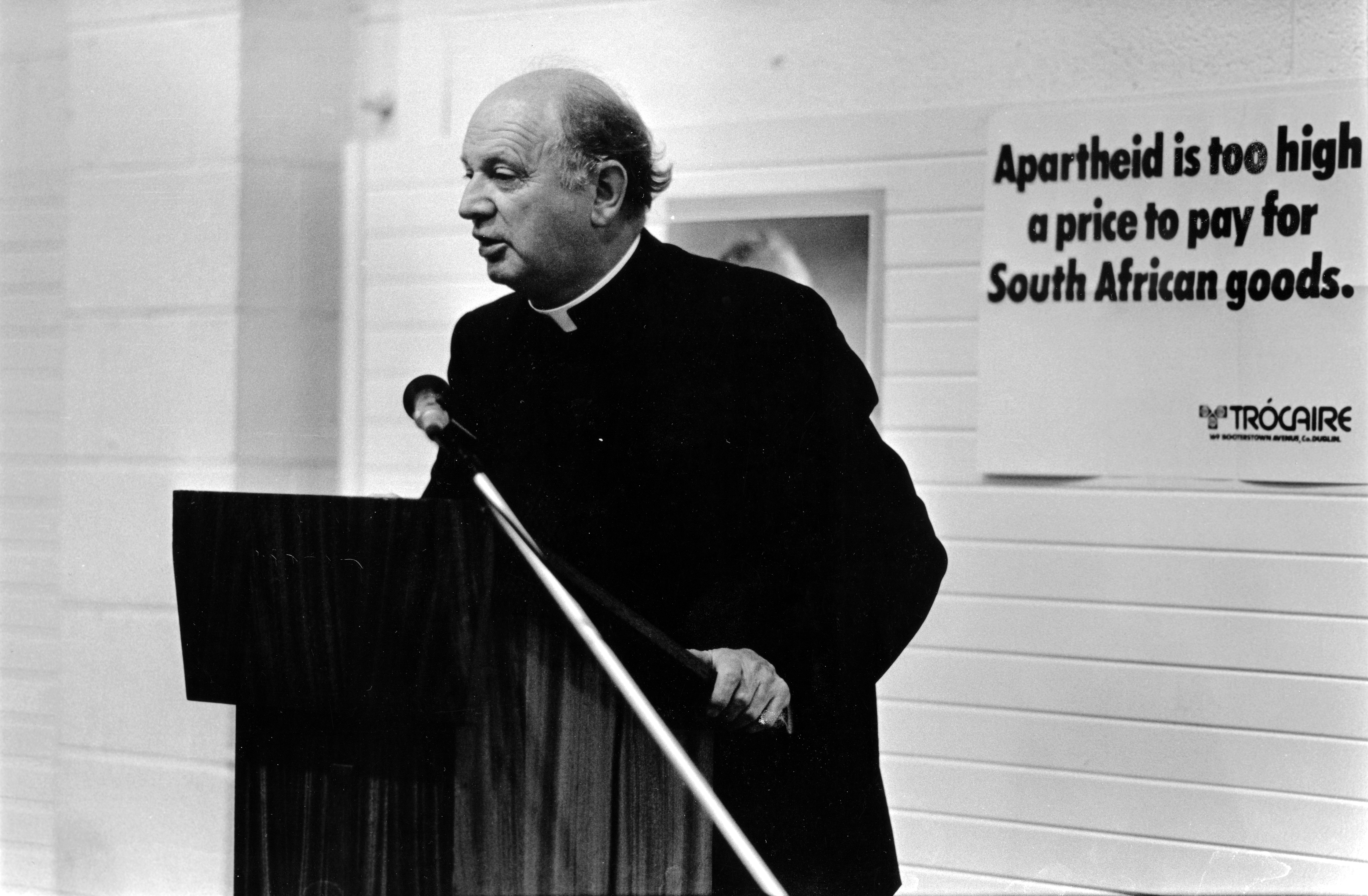
Eamonn Casey was a huge influence, agenda setter and reference point in Ireland during a vigorous contest between those who wanted a more conservative, formal and structured approach and those who highlighted human rights, justice, struggle and conflict between individuals, organisations, state and church institutions, writes Colm Regan.
In our house and among my colleagues, Eamonn Casey was known as ‘the Bishop’; not simply a title but rather a concept, an idea and, above all an agenda. When the phone rang and you heard ‘it’s the Bishop’, you knew immediately work was on the cards, work that, in my case, meant social justice, international development and educational input and ideas. Along with colleagues in Trócaire, I worked as a development education activist for over a decade with Eamonn Casey and his influence on me and my work was profound. His genuine passion and vision, tireless energy, attention to detail and (in our case) courage made him a significantly formative influence at a crucial time in Ireland’s evolving international human rights and development agenda. Sadly (and, in my view, unfairly) his subsequent history and behaviour will undermine this story and already the ‘official’ histories of the period illustrate this.
Official histories tend to describe the emergence of Ireland’s engagement with overseas justice and development issues as a neat, linear and ‘policy driven’ evolution. Not so. My experience is that it was (is) far more interesting and ‘messy’ than this; it involved very considerable arm-wrestling, debate and disagreement, manouverings and counter-manouverings between the individuals, organisations, state and church institutions. It involved a vigorous contest between those who wanted a more conservative, formal and structured approach and those who highlighted human rights, justice, struggle and conflict. And Eamonn Casey was in the middle of this – a huge influence, agenda setter and reference point. Along with significant others, he insisted on the social justice dimension, he insisted on building a public constituency for the agenda in Ireland and he insisted on the need to challenge official interpretations. This reality along with his own character and history ensured he was high-profile and, inevitably, controversial.
For me, several dimensions of the man’s vision and agenda stand out – his battles within the Bishop’s Conference over countless issues from Apartheid to Central America to Catholic Social Teaching, to his public persona, popularity and profile. He seemed to me to represent (along with others) a strand of that Conference that was more socially aware, more open in its approach to Catholic thinking and practice, engaged publicly and less formal. He worked hard along with colleagues in Trócaire to maintain that organisation’s radical mandate, something which was always the subject of controversy and debate across the church.
When Trócaire was founded in 1973, Casey insisted that 20% of its own income be allocated to education on justice and development issues – a position that was hugely radical not just in Ireland but also internationally. He worked tirelessly to build a public constituency for this agenda in Ireland, arguing that a focus solely on the ‘overseas’ was significantly deficient. And, he backed up this vision personally, expending countless hours, miles and energy in engaging ‘face-to-face’ with schools, universities, communities, trade unions, parish groups and, of course, the media.
His courage and tenacity were clearly evident to all on several high profile occasions – during Ronald Reagan’s visit to Ireland and the disgraceful decision to award him (Reagan) an Honorary Doctorate in Galway, an event in which he refused to participate; during the anti-Apartheid campaign and his support for the Dunnes Stores strikers who refused to handle South African goods; his willingness to participate in a picket outside the Dail over Ireland’s consistent failure to reach its commitment to 0.7% of GNP as aid (something which infuriated Charles Haughey and others) and his campaigning for the release of the imprisoned Niall O’Brien in the Philippines. He was willing to resist the immense pressure placed on him by church, state and business interests, despite the cost at times.
Working alongside Eamonn Casey was demanding, the endless drafts of lectures, speeches and inputs (up to 6 and 7 drafts at any time); the hours he required to get things right, the ongoing support he took for granted and the focus on his own agenda sometimes at the cost of others. But he was also demanding of himself and he was also prepared to put himself out. An example, the husband of a school principal friend of mine was dying from cancer and had become estranged from his church; she asked me if the Bishop might visit him when next in Dublin. I duly passed on the message and heard no more. Subsequently, I learned that Eamonn had left Galway in the late afternoon, driven to Dublin, visited him and then returned to Galway.
But Eamonn Casey also had, as we well know, feet of clay. He was vain, self-pre-occupied, aware of his position as a senior cleric, often ignorant of other’s needs and agendas, and elitist. Like so many of us, he too was human displaying many human weaknesses and failings. This became spectacularly obvious over the Annie Murphy debacle and its consequences at so many levels including that of the agenda he so strongly identified with. It highlighted his lack of personal courage in a key dimension of human life – a failing that had many consequences for others immediately around him but also those distant from him.
Personally, I have been privileged to work alongside Eamonn Casey; he (often without knowing it) hugely shaped my life and that of my family, he taught me many, many lessons (not all of them positive) and, above all, he created the platform that allowed me to pursue a life-long passion – education for social justice. When the dust finally settles, I hope that his ‘story’ will be more rounded recognising the many positive contributions Eamonn Casey made to an important strand of Irish life nationally and internationally.
